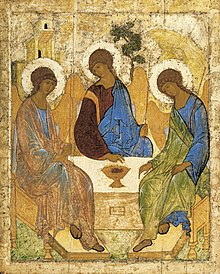A Theology of Worship
It is a reality of life that we all make assumptions. There’s
no getting past that fact. What is important is to identify our assumptions and
test them using an appropriate theological method. Before moving on to more
specific issues relating to Christian worship, which I’ve previously identified
as something I intend to write upon this year, I need to summarise a
significant theological assumption of mine. I recognise that this impacts much
of my thinking and my own approach to worship, but having thought through many
of the implications of this assumption I would like to suggest that I find it appropriate.
Here it is:
I assume that the purpose of life is to live in relationship with God, humanity and all of creation.
 This is based on an understanding of God as primarily a relational God. This is observed both in
the Trinity and in the way God has revealed himself throughout history. The Triune
God created from within the Divine relationship in order to extend that
relationship towards creation. Sin disrupted the relationship between God and
his creation, but also within creation itself, in a way that humanity cannot possibly
restore on its own. Even though this relationship with God is disturbed (but
not yet destroyed) the faithful party (God) continues to remain faithful and never
abandons his people. He continuously pursue humanity because of his love and desire
to restore the relationship he created them for, even while they are
disobedient. Whilst God justly disciplines unfaithfulness, even so he graciously
extends himself towards the completely underserving in order to restore the relationship
to where he intends it to be.
This is based on an understanding of God as primarily a relational God. This is observed both in
the Trinity and in the way God has revealed himself throughout history. The Triune
God created from within the Divine relationship in order to extend that
relationship towards creation. Sin disrupted the relationship between God and
his creation, but also within creation itself, in a way that humanity cannot possibly
restore on its own. Even though this relationship with God is disturbed (but
not yet destroyed) the faithful party (God) continues to remain faithful and never
abandons his people. He continuously pursue humanity because of his love and desire
to restore the relationship he created them for, even while they are
disobedient. Whilst God justly disciplines unfaithfulness, even so he graciously
extends himself towards the completely underserving in order to restore the relationship
to where he intends it to be.
We see this pattern emerge right from the first occurrence of
sin, all the way through the Scriptural narrative, until the ultimate act of
redemptive and reconciling love in the person of Jesus Christ. Jesus, by virtue
of his relationship with God’s very self (Son of God), embodies God’s love for
humanity. Jesus, by virtue of his relationship to humanity (Son of Humanity), embodies
the faithful obedience to God that the rest of humanity could never achieve;
particularly in his suffering and death on the cross. As a result the risen Jesus
Christ has become the means by which all of humanity can be restored to right
relationship with God. The Holy Spirit unites us with Christ and so we are one
with him in his resurrected life. As a result of this newfound relationship with
Christ we are restored to right relationship with God. We know in Christ what
it means to be faithful, and because our life is “hidden with Christ in God”
(Col 3:3) our own unfaithfulness is forever lost within his faithfulness. The Spirit
enables us to now go on living out Christ’s faithfulness within the world. Whilst
this restored relationship between God and his creation is made perfect in
Christ, it is not yet made complete in us. We live in the tension of being
assured of our ‘betrothal’ to Christ, yet awaiting the ‘wedding day’ when that
relationship between the Triune God, his church, and the rest of creation will
be finally restored. No more pain. No more tears. No more suffering. Perfectly
one with God, in Christ, by the Spirit.
Whilst the assumption itself is fairly straightforward (it
can be summarised quite simply as ‘relationship’) you can see that it has a profound
influence upon the any subsequent theology. This is why it’s so important to
identify the assumptions we make. It also has a profound impact on the way we seek
to articulate a theology of worship. From this starting assumption, worship is
described as an extension of our relationship with God, in Christ, by the
Spirit. James B. Torrance describes it this way:
Worship… is the gift of participating through the Spirit in the incarnate Son’s communion with the Father. It means participating in union with Christ, in what he has done for us once and for all, in his self-offering to the Father, in his life and death on the cross. It also means participating in what he is continuing to do for us in the presence of the Father and in his mission from the Father to the world.[1]
Whilst there is much more that could (and will) be
said, this post provides some important foundational work for the rest of what
will be discussed on worship from here on. I pray that God will continue to make
himself known as we continue to walk by the Spirit, in union with Christ,
towards God’s ultimate purposes for us all.
[1] James
B. Torrance, Worship, Community & the Triune God of Grace. (Downers
Grove: InterVarsity Press, 1996), 20-21.


Comments
Post a Comment